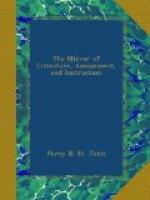But she lies forlorn in the breakers now,
Her stately masts are gone,
And cold are the hearts of the dauntless
crew
That yielded their swords
to none;
The gun is hush’d in her lofty sides,
And the flute on her silent
deck;
Alas! that a queenly form like hers
Should ever have been a wreck!
Thus Hope’s illusions droop away
From the heart which their
beauty won,
And leave it forlorn as the gallant ship,
Ere its summer of life is
begun.
It is peopled with lovely images,
As o’er the sea it glides,
But wreck’d is its deep idolatry
On the dark and stormy tides.
Deal. G.R.C.
* * * * *
THE ARBALEST OF ROBIN HOOD.
(TO THE EDITOR.)
In No. 538, of The Mirror, is described an elegant Cross-bow, and a desire expressed for information where such things are now to be seen. I have lived many years in Yorkshire, and have seen several kinds of these bows at Kirklees Hall, the seat of Sir George Armitage, a few miles from Huddersfield. Amongst those bows I saw one, at least six feet long; but some of them were not more than two or three feet in length. There were also a variety of weapons of war, with helmets, and some curious boots, which buttoned on the leg from top to the bottom, and had wooden soles. They were then kept in an attic on the top of the leads over the hall. Many of these relics are said to have belonged to the famous “Robin Hood,” who lies buried in the park; the remains of the ancient grave-stone having been surrounded with a handsome iron railing, by the late Sir George Armitage; in the wall is an old inscription on brass; it is situated in a very gloomy place. Not far distant from his grave are the remains of a Nunnery, and a burial-ground, with tombs in it; but I could find no date, either in the house or on these tombs. One of the tombs has this inscription round its edge:
“Sweet Jesus of Nazareth,
show mercy to Elizabeth Stainton, late
Prioress of this place.”
If an intelligent person were to call at the Hall, he would be able to gather much information of an authentic nature respecting Robin Hood.[1]
[1] We hope this note may
meet the eye of some of our Yorkshire
correspondents.
JOHN BATEMAN.
* * * * *
SONGS, FOUND IN THE ALBUM OF A DELIA CRUSCAN POET.
(FOR THE MIRROR.)
THE HUMMING-BIRD.
BY T. MOORE, ESQ.
Thou winged gem, whose starlike splendour
Gleams on the bosom of the
rose,
I lore thy light when skies are tender,
And winds are wandering to
repose.
The Grecian lute, the Moorish song,
And Crockford’s home,
with all that’s in it,
May challenge fame from many a throng,
But thou, alone, fair
bird, canst win it!




